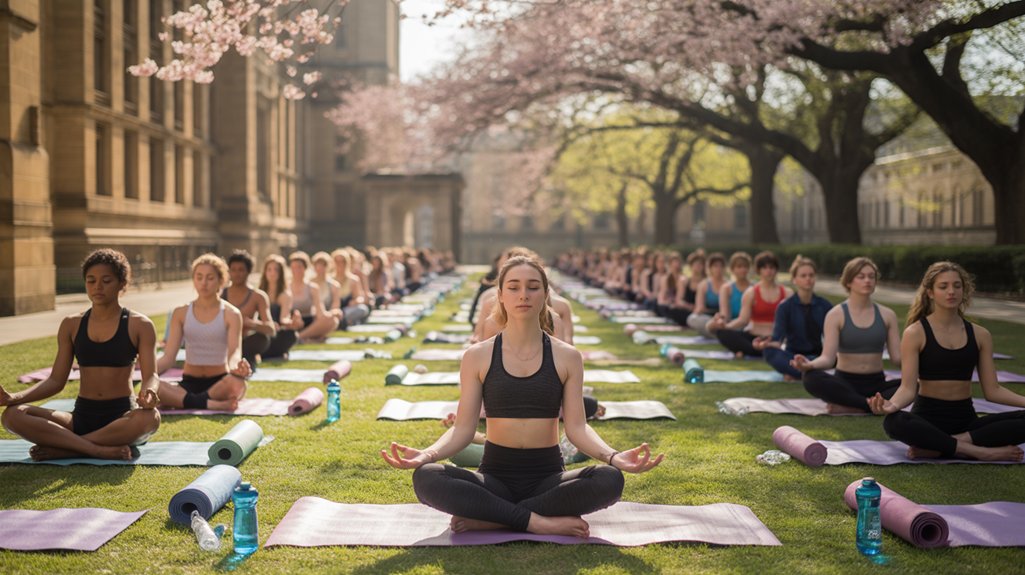You’ve probably noticed your university experience doesn’t revolve around pub crawls and Wednesday night drinking sessions anymore. UK universities are witnessing a quiet revolution as students trade alcohol-fueled socializing for meditation circles, sober retreats, and wellness communities. This shift isn’t just changing how you connect with peers—it’s fundamentally transforming what campus life means. But what’s driving this dramatic cultural change, and how will it reshape your entire university journey?
The Decline of Traditional University Drinking Culture
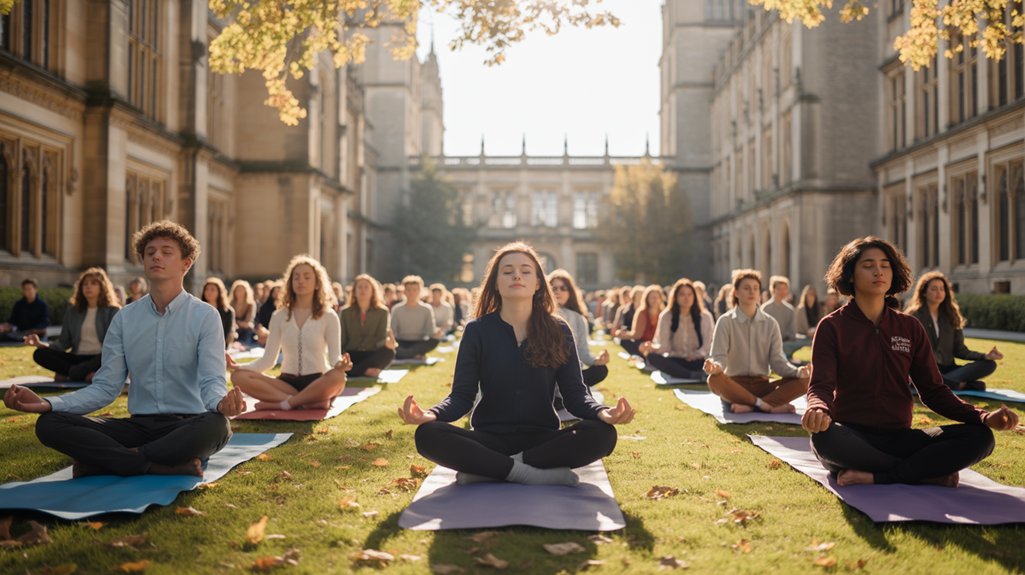
While pub crawls and freshers’ week binge drinking once defined the quintessential British university experience, today’s students are increasingly turning away from alcohol-centered social activities.
You’ll find fewer students participating in traditional drinking societies and bar crawls that previously dominated campus social calendars. This shift reflects changing attitudes toward health, wellness, and social connection among Gen Z students.
You’re witnessing universities responding by reducing alcohol-focused events and creating alternative social spaces.
Student unions now offer more sober entertainment options, from late-night coffee bars to alcohol-free dance parties. Many students cite mental health awareness, fitness goals, and financial constraints as reasons for avoiding heavy drinking culture.
This transformation marks a significant departure from decades-old traditions that once seemed inseparable from British university life.
Rise of Campus Wellness Programs Across UK Universities
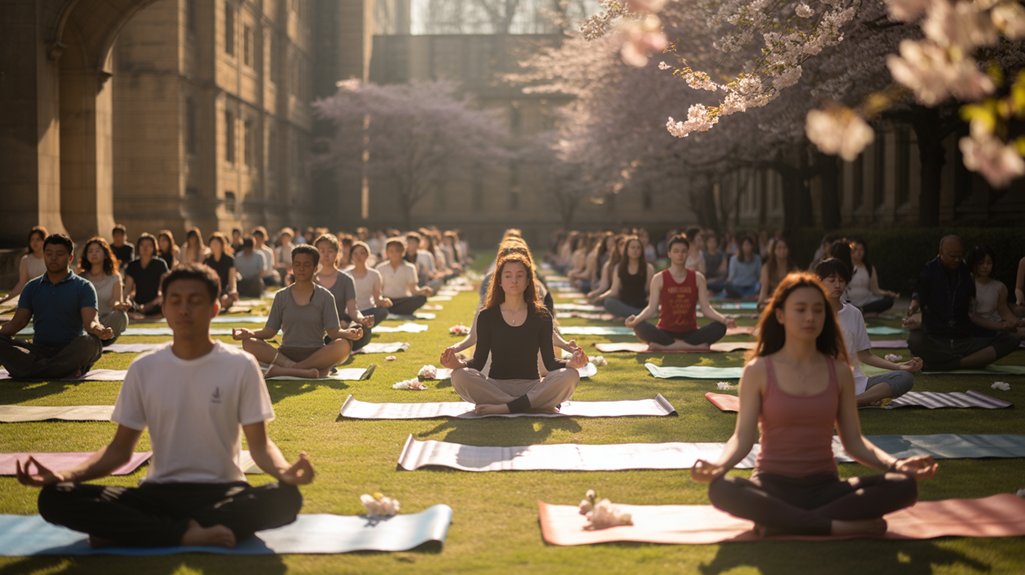
How are UK universities filling the void left by declining drinking culture?
You’ll find institutions across Britain launching comprehensive wellness programs that prioritize mental health and mindful living. Universities like Manchester, Edinburgh, and Bristol have introduced meditation spaces, sober social events, and dedicated wellness coordinators who organize alcohol-free activities.
You can now join yoga societies, attend mindfulness workshops, and participate in sober retreats that weren’t available just five years ago.
These programs aren’t afterthoughts—they’re becoming central to campus life. Universities are investing significantly in mental health resources, creating designated quiet spaces, and hosting wellness fairs that showcase alternatives to traditional party culture.
You’re witnessing a fundamental shift where institutions actively promote healthy lifestyle choices rather than simply tolerating problematic drinking behaviors.
Student-Led Sober Societies and Alcohol-Free Events

Students themselves are driving the most significant changes in campus social culture by establishing thriving sober societies and organizing alcohol-free events that rival traditional nightlife.
You’ll find these student-led groups hosting everything from midnight movie screenings and board game tournaments to dance parties with mocktails and live music.
Universities like Bristol, Edinburgh, and Manchester report their sober societies have tripled membership over three years.
These groups aren’t just creating alternatives—they’re redefining what social connection looks like on campus.
You can attend comedy nights, outdoor adventures, and creative workshops where meaningful conversations happen without alcohol as a social lubricant.
Students say they’re building deeper friendships and discovering authentic ways to have fun while supporting their mental health and academic goals.
Meditation and Mindfulness Centers Transform University Libraries

Across thirty-seven UK universities, traditional library spaces are being redesigned to include dedicated meditation and mindfulness centers that offer students refuge from academic pressure.
You’ll find soundproof pods equipped with guided meditation apps, breathing exercise stations, and quiet zones specifically designed for mindfulness practice. These centers operate alongside traditional study areas, giving you immediate access to stress-relief tools during intense revision periods.
Universities like Manchester and Edinburgh have reported 40% increases in library usage since introducing these wellness spaces. You can book twenty-minute meditation sessions between lectures or attend daily mindfulness workshops led by trained facilitators.
The integration transforms libraries from purely academic spaces into holistic learning environments that support both your intellectual and emotional well-being throughout your university experience.
Yoga and Fitness Communities Replace Pub Social Networks
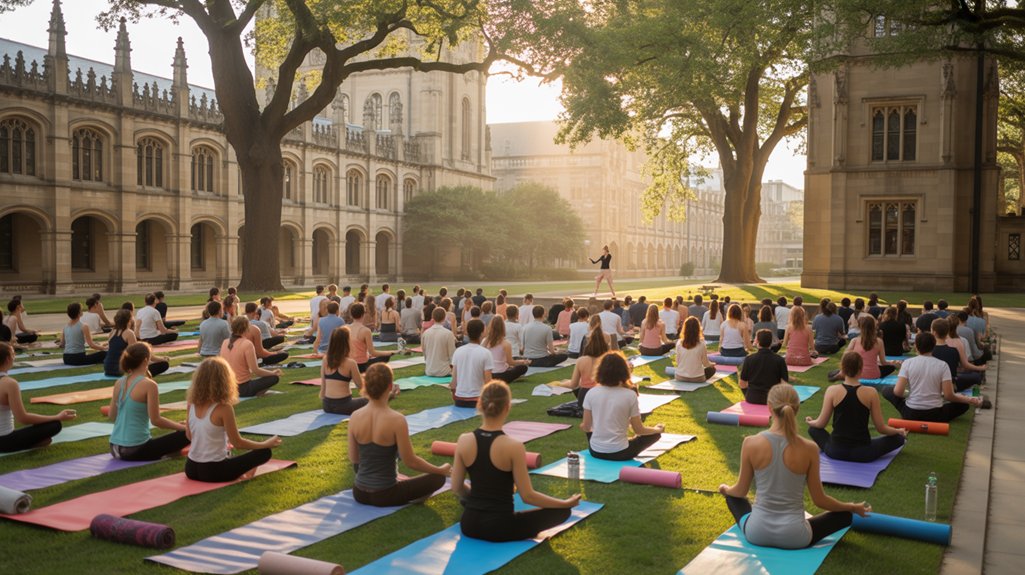
While traditional pub culture once dominated university social life, fitness-focused communities are now reshaping how you’ll connect with peers across UK campuses.
You’ll find yoga societies hosting sunrise sessions in student halls, while running clubs organize weekend trail adventures instead of bar crawls. These wellness-centered groups offer genuine friendship without alcohol’s social crutch.
You’re joining communities that prioritize mental clarity and physical strength over hangovers and regret. University fitness centers report 40% increased membership, with students choosing morning workouts over late-night drinking sessions.
You’ll discover rock climbing societies, meditation groups, and outdoor adventure clubs creating lasting bonds through shared challenges.
This shift means you’re building relationships based on mutual growth, accountability, and authentic connection rather than temporary liquid courage.
Mental Health Awareness Drives Lifestyle Changes

Growing recognition of anxiety and depression’s impact on academic performance has sparked a campus-wide rethinking of student lifestyle choices.
You’re witnessing universities implement mandatory mental health screenings and wellness workshops that directly link alcohol consumption to deteriorating psychological wellbeing. Studies you’ll encounter show binge drinking worsens anxiety symptoms by 40% and disrupts sleep patterns essential for cognitive function.
You’re seeing counseling services report that students who’ve adopted sober lifestyles demonstrate improved focus, better grades, and reduced panic attacks.
Mental health first aid training now includes alcohol awareness components, teaching you to recognize when drinking becomes a coping mechanism.
Universities you’ll visit increasingly promote mindfulness apps, stress management courses, and peer support networks as healthier alternatives to traditional drinking-based stress relief methods.
Universities Invest in Wellness Infrastructure and Facilities
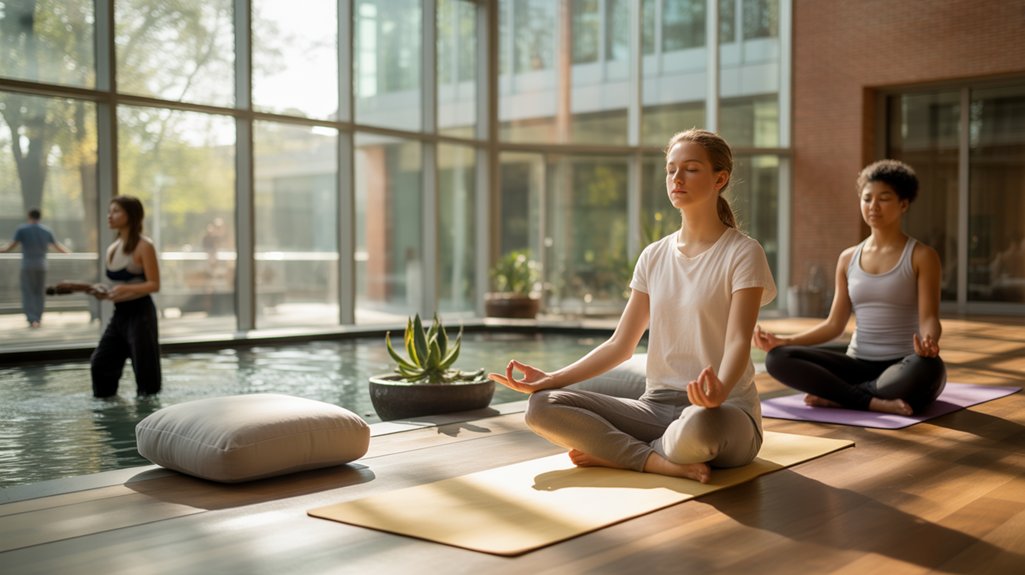
Since mental health awareness has shifted campus priorities, you’re now finding universities channeling significant budgets into wellness-focused infrastructure that supports sober living.
You’ll discover meditation rooms replacing traditional bars in student unions, with soundproofed spaces featuring ambient lighting and comfortable seating.
Universities are constructing dedicated wellness centers equipped with yoga studios, mindfulness zones, and quiet study areas designed for stress reduction.
You’re seeing fitness facilities expanded beyond basic gyms to include specialized spaces for tai chi, pilates, and group meditation sessions.
Many campuses now feature outdoor wellness gardens with walking paths and reflection areas.
Student accommodation blocks increasingly include alcohol-free floors and wellness-themed housing options.
These investments demonstrate universities’ commitment to supporting students who choose sobriety and prioritize mental wellbeing over traditional drinking culture.
Sober Retreats and Weekend Wellness Programs Gain Popularity
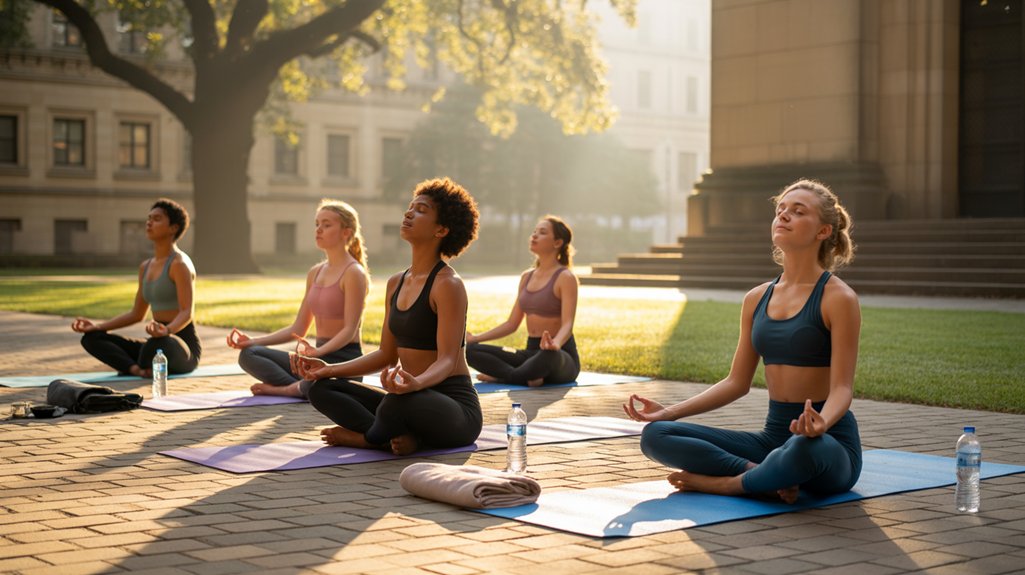
Universities across the UK are launching weekend wellness retreats that offer students structured alternatives to traditional party culture.
You’ll find these programs combining mindfulness workshops, nature walks, and group therapy sessions designed to build genuine connections without alcohol. Manchester University’s “Reset Weekends” attract over 200 participants monthly, while Edinburgh’s “Mindful Escapes” feature digital detox components alongside meditation training.
These retreats aren’t just avoiding alcohol—they’re actively promoting mental health skills you’ll use throughout your academic career. You can participate in sunrise yoga, creative writing workshops, and peer support circles that address academic stress and social anxiety.
Bristol University reports that 85% of retreat participants continue attending sober social events afterward, demonstrating these programs’ lasting impact on student wellness choices.
Academic Performance Benefits of Alcohol-Free Campus Life
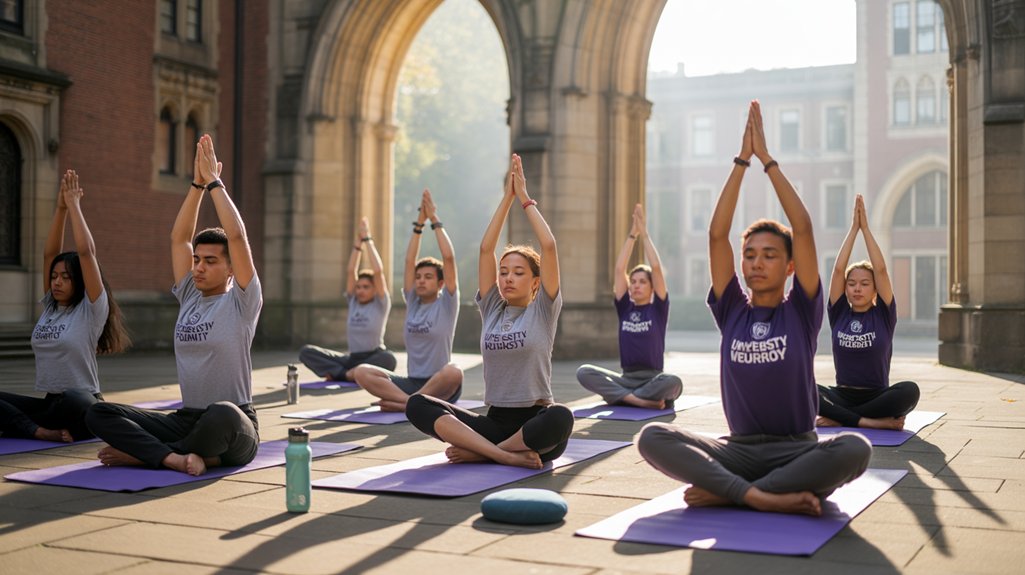
When you eliminate alcohol from your university experience, your academic performance shows measurable improvements across multiple areas.
You’ll notice enhanced focus during lectures and study sessions, as alcohol no longer disrupts your sleep cycles or cognitive function. Your memory retention increases significantly, making it easier to absorb complex concepts and recall information during exams.
Research from Manchester University shows sober students achieve grades averaging 8% higher than their drinking peers.
You’ll spend more time on coursework instead of recovering from hangovers, and your attendance rates improve dramatically. Your critical thinking skills sharpen without alcohol’s impairment, leading to better essay quality and problem-solving abilities.
Additionally, you’ll save money typically spent on drinks, reducing financial stress that often impacts academic concentration and performance.
Future of University Social Culture and Institutional Response
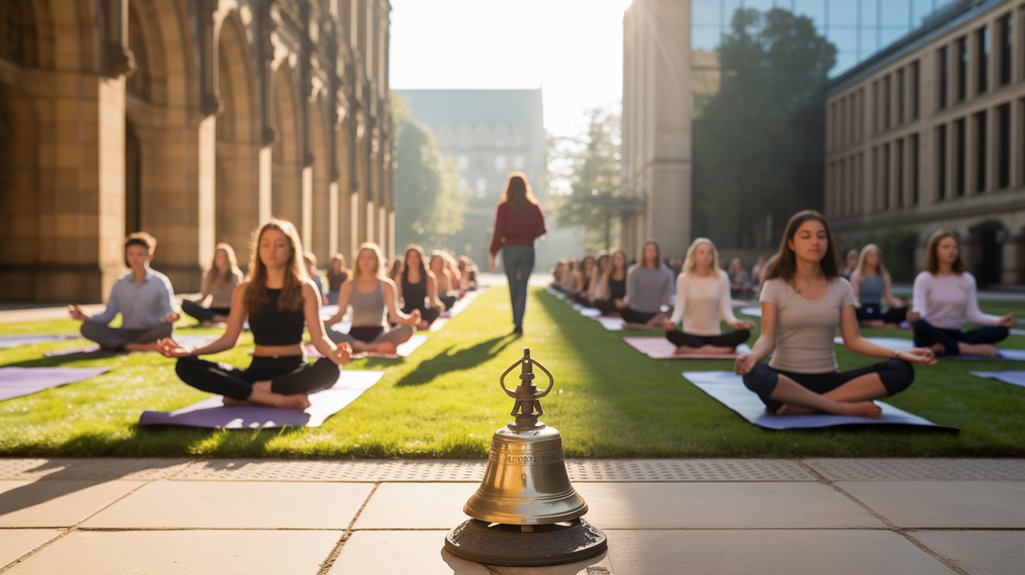
As student preferences shift toward healthier lifestyles, you’re witnessing a fundamental transformation in how universities approach social programming and campus culture.
Institutions are investing in wellness centers, expanding mental health services, and creating alcohol-free social spaces. You’ll see more universities hiring wellness coordinators and implementing peer support programs that normalize sobriety.
Student unions are redesigning their facilities to include meditation rooms, fitness studios, and quiet study areas rather than focusing solely on bars and pubs.
You’re also noticing universities partnering with local businesses to offer discounted yoga classes, hiking trips, and cultural events that don’t revolve around drinking.
This shift means you’ll experience more inclusive campus communities where students who choose sobriety aren’t marginalized, creating environments where everyone can thrive academically and socially.
Conclusion
You’re witnessing a fundamental shift in UK university culture that’ll reshape your entire academic experience. As you embrace meditation centers, sober societies, and wellness retreats, you’re creating deeper connections and achieving better academic results. You’re not just avoiding alcohol—you’re actively choosing a lifestyle that prioritizes mental health, meaningful relationships, and personal growth. This transformation you’re driving will define university life for future generations.
